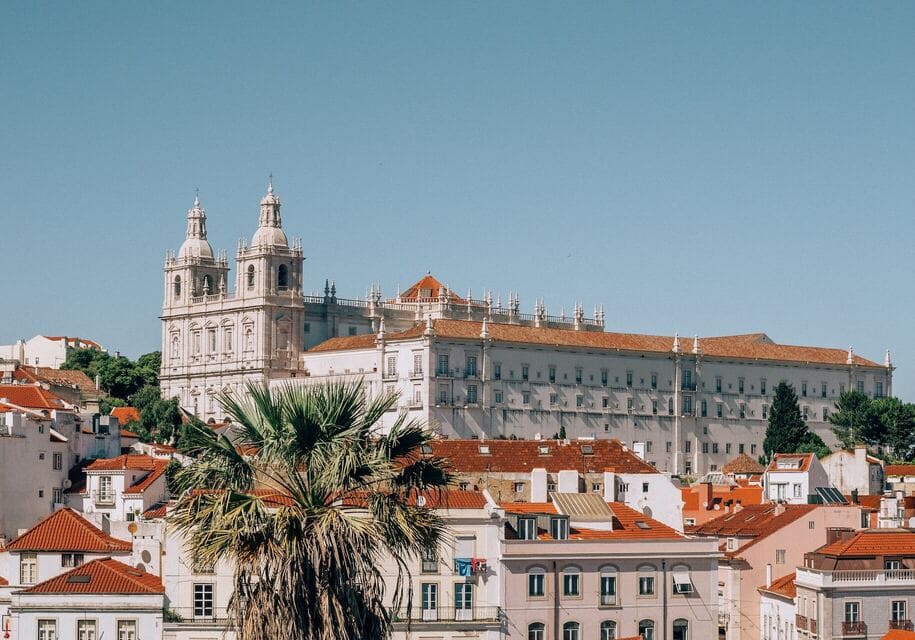
The Entrepreneur or Startup Visa (D2 Visa) caters to budding entrepreneurs and business owners keen to invest in Portuguese companies or create Portugal-based businesses.
The D7 Visa, also known as the Passive Income Visa or Retirement Visa, is a type of residency permit designed for individuals who have a source of stable passive income (from pensions, investments, property, royalties, etc.) and wish to live in Portugal without having to engage in active employment or business activities.
This article thoroughly compares the D2 and D7 Portugal visas and highlights their fundamental differences to help you choose the one that best suits your needs.
D2 vs D7 Visa Portugal: An Overview
 About the D2 Visa (Entrepreneur Visa)
About the D2 Visa (Entrepreneur Visa)
What is the D2 Visa?
The Portugal D2 Visa is intended for non-European Union (non-EU) citizens who want to either start a new business or extend their existing business to Portugal. D2 Visa holders may opt to invest in an existing business in Portugal.
Often referred to as the Immigrant Entrepreneur Visa or Business Visa, the D2 Visa was created by the Portuguese government to raise external resources and investments to boost the country’s economy.
The Portugal D2 Visa has two categories – the entrepreneurial route, ideal for applicants with solid business plans who wish to start new businesses, and the independent service provider route, for applicants offering services to local or global clients.
 Key benefits of the D2 Visa
Key benefits of the D2 Visa
- Entrepreneurial opportunities: D2 Visa holders can explore new businesses, invest in existing businesses, or engage in entrepreneurial activities in Portugal
- Visa-free travel within the Schengen Area: With the D2 Visa, holders have the same travel rights as European citizens and can move freely within the Schengen countries without an additional visa.
- Family reunification: The D2 Visa often allows for family reunification, meaning you can bring family, including a spouse, dependent children, or parents, to join you in Portugal.
- Pathway to permanent residency and Portugal citizenship: After five years of obtaining legal residence, you may be eligible for permanent residency in Portugal and eventually become a Portuguese citizen, provided the necessary requirements are met.
- Tax incentives: As a D2 Visa holder (an EU/EEA/Swiss citizen or residence permit holder), you can apply for Portugal’s new NHR tax regime, the Incentive for Scientific, Research, and Innovation.
- Residency rights and access to services: With the temporary residency permit, you will have access to Portuguese state healthcare, and your children can enroll in the public education system.
 About the D7 Visa
About the D7 Visa
What is the D7 Visa?
Introduced by the Portuguese government in 2007, the Portugal D7 Visa, also known as The Portugal Retirement Visa, allows non-EU nationals to reside in Portugal legally, provided that they meet the minimum passive income requirements.
The D7 is also called the Passive Income Visa or Retirement Visa because pension payments are also considered a viable, stable, passive income source for this visa.
Essentially, the Retirement Visa is for non-EU/EEA/Switzerland citizens who are retirees or have a stable passive income stream from pensions, investments, rental income, or other passive income sources.
Read our article: Retire in Portugal 2024 to learn more about living as a retiree in Portugal.
Key benefits of the D7 Visa
- No active business involvement: Unlike other visa types, such as the D2 Entrepreneur Visa, the D7 Visa does not require individuals to establish or manage a business in Portugal.
- Access to Portuguese public services: D7 Visa holders have access to public services in Portugal, including healthcare and education.
- Free travel within the Schengen countries: The D7 Visa also grants its holders the same travel rights as European Union citizens. This means you’ll have access to the Schengen Area’s 27 European countries without a visa.
- Family reunification: As with the D2 Visa, the D7 Visa allows applicants to bring their family members to live in Portugal. Spouses, children under 18, or dependent family members can also apply for the visa and reside in Portugal with the primary D7 Visa holder.
- Path to permanent residency: After five years of continuous residency in Portugal under the D7 Visa, visa holders may be eligible for permanent residency and Portuguese citizenship, which may lead to the acquisition of a Portuguese passport.
D2 vs D7 Visa Portugal: The Main Differences
Purpose
The D2 and the D7 Visa are popular residency visas for foreign nationals looking to relocate to Portugal.

The D2 Visa is for individuals who want to engage in entrepreneurial activities in Portugal. It is a residency program for applicants with a business plan looking to start a new business, expand their existing business, or invest in entrepreneurial ventures within the country.
The D7 Visa, on the other hand, is suitable for financially independent individuals, including retirees, who have a passive income and plan to settle in Portugal permanently.
So, if you come to Portugal with a job offer or the goal of setting up a company, the D2 Visa is suitable. If you have a passive income and want to live in Portugal without working, the D7 Visa is a viable option.
Eligibility criteria
The Portugal D2 Visa requirements are:
- Be a non-EU national.
- Acquire a Portuguese company or have an existing business abroad and intend to open a branch in Portugal.
- Proposing a comprehensive business plan for a new company in Portugal.
- Be a liberal professional.
The D2 Business Visa applicant must demonstrate their business’s potential economic and social contributions to Portugal.
To be eligible for the D7 Visa, you must:
- Be a non-EU national.
- Have a passive income of €870.00 per month, plus 50 percent for a spouse and 30 percent for each minor dependent.
- Provide proof of savings that could support you and any dependents for at least two years (i.e., through bank statements or savings accounts).
- Show proof of residence in Portugal.
Want to know if you qualify for the D7 Visa? Take our free D7 eligibility test to find out. If you are not eligible for the Portugal D7 Visa, the Portugal Digital Nomad Visa (D8) is a great alternative.
We’ll discuss this alternative visa option as we progress.
Required time spent in Portugal
One similarity between the D2 Business Visa and the D7 is that both residency programs require you to live in Portugal for a significant part of the year.
Income requirements
D2 Visa income requirements
The D2 is popular because it has no minimum investment requirement. To qualify for this residence visa, the applicant must have a solid business plan and demonstrate proof of means of subsistence. Usually, this implies having financial resources for at least 24 months, equivalent to the national minimum wage.
D7 Visa income requirements
One of the primary requirements for the D7 residency visa is that applicants must have sufficient passive income to support themselves while living in Portugal.
The main applicant must submit evidence of a regular income of at least €870.00 per month. The passive income total presented as evidence can come from various sources, such as pensions, investments, or rental income.
Please note that these minimum income requirements vary depending on the number of dependents accompanying the main applicant. The higher the income shown, the smoother the visa process may be, as it confirms your ability to sustain your life in Portugal without needing to work or produce additional income locally.
Another financial requirement of the D7 Passive Income or Retirement Visa is that the foreign citizen keeps a minimum balance of €10,440.00 in a Portuguese bank account throughout the application period (two years).
This balance increases with additional family members:
- An extra 50 percent (€5,220.00) is needed for a spouse or any other family member over 18,
- An extra 30 percent (€3,132) is needed for each family member under 18.
For example, a family of four with two adults and two minors must meet minimum income requirements and maintain at least €41,488.00 in their Portuguese bank account during the family reunification period.
Tax requirements
As a business visa or a D7 visa holder, you can be eligible to apply for the Non-Habitual Residency (NHR) scheme should your D7 Visa application and/or issuance have been processed on or before 31 December 2023. The NHR program, though phase-out, allows you to enjoy significant tax advantages for up to ten years.
Has NHR ended?
Yes, the Non-Habitual Resident tax regime closed in January 2024 and the transition period ended in March 2025. The Tax Incentive for Scientific Research and Innovation (IFICI) has replaced the scheme, which has now been implemented. Current NHR holders are not impacted by the changes. To learn more, please refer to Portugal's new NHR guide.
Application Process: D2 Startup Visa vs D7 Passive Income Visa Portugal
D2 Visa application process

- Gather all required documentation related to the business, as well as criminal record certificates, health insurance, and bank statements.
- Acquire a Portuguese tax number (NIF).
- Open a Portuguese bank account and transfer funds to it.
- Secure long-term accommodation in Portugal by purchasing or renting a property for a recommended minimum duration of one year, even if an early termination clause is included.
- Submit documents and apply online via VFS or the E-Visa Portal at your local Portuguese Consulate or VFS.
The Portugal D2 Visa processing time is up to 60 days (about 2 months). Upon approval, you will be issued a four-month Portugal residence permit to travel to Portugal to apply for a temporary residence permit valid for two years.
This temporary residence permit can be subsequently renewed for three years. After five years of legally living in Portugal, you can apply for a permanent residence permit and Portuguese citizenship, which usually involves passing a basic test in the Portuguese language for non-Portuguese-speaking applicants.
D7 Visa application process
To apply for the D7 Visa, you must:
- Gather the necessary documents (including criminal record certificate, health insurance, and bank statements)
- Secure a Tax Identification Number from the Portuguese tax authorities
- Proof of passive income or financial resources
- Secure long-term accommodation in Portugal
- Submit your application online via either VFS or the E-Visa Portal
If your visa application is approved, the Portuguese Consulate will issue a D7 Visa, valid for four months from the issue date.
The D7 Visa allows you to enter Portugal. After that, you must attend your AIMA appointment to enrol your biometric data and formalize the residence permit request.
A temporary residence card will then be granted for two years. After this period, the Portuguese residence permit must be renewed and valid for three years. After five years, you may apply for permanent Portuguese residency.
D2 vs D7 Visa Portugal: Visa Costs and Fees
The government fee for both the D2 Business Visa and the D7 Visa is approximately €90.
For your residence permit, you can expect to pay around €160.
When applying for Portugal’s D2 or D7 Visas, it’s important to note that additional costs may apply, especially if you engage a legal practitioner or Portugal D2 Visa lawyer. These costs can vary based on the complexity of your case and the level of assistance required. Be sure to factor in these potential expenses when planning your visa application process.
D2 vs D7 Visa Portugal: Which One to Choose?
Below is a clear distinction of the two Portuguese visas:
Portugal D2 Visa is the right choice for you if
- You plan to start and manage a business or invest in an existing one in Portugal.
- You have a well-defined and detailed business plan outlining your investment and job creation goals.
- You are willing to reside in Portugal for a significant portion of the year to manage your business.
Portugal D7 Visa is the right choice for you if
- You have a stable and regular source of passive income, such as pensions, investments, or rental income.
- You are seeking to reside in Portugal without the need to engage in active employment or business activities.
- You are willing to live in Portugal for a significant portion of the year
- You value a peaceful and self-sufficient lifestyle, as the D7 Visa does not require active management of a business in Portugal
Category | D2 Visa | D7 Visa |
Intended for | Entrepreneurs | Self-employed individuals/ Retirees |
Financial requirements | Capital to establish or invest in a business, and sufficient funds to cover your living expenses | Have 100% of the Portuguese minimum annual salary, which is €9,870 |
Criteria to be eligible | Be a non-EU/EEA/Switzerland freelancer, entrepreneur, or independent service provider | Be a non-EU/EEA/Switzerland individual with a passive source of income |
Visa fees | Approximately €90 | Approximately €90 |
Permanent residency | After 5 years of uninterrupted living in Portugal | After 5 years of uninterrupted living in Portugal |
Stay requirement | Requires you to live in Portugal | Requires you to live in Portugal |
Rights | Live, work, study, healthcare | Live, work, study, healthcare |
Family members | Yes, through the family reunification process | Yes, through the family reunification process |
Visa free movement | Schengen Area and certain EU countries | Schengen Area and certain EU countries |
Alternatives to D7 and D2 Visas
D8 Visa Portugal
The Digital Nomad Visa, or the Freelancer Visa, is specifically designed for remote workers who can work anywhere. This visa allows applicants to work for a foreign company while residing in Portugal.
To be eligible, you must prove that you have a minimum monthly income of €3,480.00 (four times Portugal’s minimum wage) and comprehensive health insurance that meets Portuguese standards. Additionally, you must prove that you have a contract with a foreign company or are self-employed.
Why choose Global Citizen Solutions for your Immigration Visa?
GLOBAL APPROACH BY LOCAL EXPERTS
- GCS has offices located across Portugal.
- Members of the US-Portugal and UK-Portugal Chambers of Commerce in Portugal, and the Investment Migration Council (IMC).
- Our expert team can help you throughout your journey to secure your Visa.
100% APPROVAL RATE
- Our successful track record in applications provides reassurance to applicants.
- We have helped clients from more than 35 countries secure residency in Portugal.
ALL-ENCOMPASSING SOLUTION
- With a single channel of communication, our approach ensures that you have complete clarity on your application.
- Our BeGlobal® Onboarding System allows for a total flow of information.
TRANSPARENCY AND PRIVACY
- Our pricing is clear and detailed, you will not face any hidden costs.
- All data is stored within a GDPR-compliant database on a secure SSL-encrypted server.

Frequently Asked Questions about the D2 vs D7 Visa Portugal
What is the difference between D2 and D7 in Portugal?
Portugal D7 Visa is tailored for individuals who have a stable passive income, such as pensions, rental income, or investments. On the other hand, the D2 Visa caters to entrepreneurs interested in starting or growing a business in Portugal, thus contributing to the Portuguese economy.
What are the disadvantages of D7 Visa in Portugal?
While the Portugal D7 Visa offers several benefits, it also has some potential disadvantages, depending on individual circumstances and preferences. One of the disadvantages is that D7 Visa holders must make Portugal their primary country of residence.
This requirement may not align with the travel or residency preferences of some individuals.
Who is eligible for D7 Visa?
To be eligible for the D7 Visa, you must be a non-EU national and earn a passive income of at least €870.00 per month (your passive income can come from pensions, transferable equity, rental income, intellectual property, or financial equity). You also must show proof of a place to live in Portugal.
How does Portugal D7 Visa work?
D7 Visa applicants must meet certain eligibility criteria, including having a stable source of passive income. Once the application is approved, applicants receive the D7 Visa, allowing them to enter the Portuguese territory and reside in the country legally. Once here, they’ll get a temporary Portugal residency permit valid for two years, which can be renewed for a three-year period.
What are the rules for D7 Visa Portugal?
You must be a non-EU national and prove that you have a source of passive income. The amount must exceed the Portuguese minimum wage (€870.00). You also must show that you have sufficient funds to support yourself and any dependents if that’s the case.
Who is eligible for D2 Visa?
If you plan to start a business in Portugal or buy a Portuguese business, you can apply for a Portugal D2 Visa. Entrepreneurs can get a residence permit through the D2 Visa and benefit from the right to live in Portugal, as well as having visa-free travel access to other Schengen countries.
Is there an income requirement for the D2 Visa?
The financial requirement for the D2 Visa typically involves demonstrating that you have the necessary capital to establish or invest in a business, as well as sufficient financial means to cover your living expenses in Portugal.
What is the difference between the D2 and the Portugal Golden Visa?
The Portugal D2 Visa is primarily intended for individuals who want to engage in entrepreneurial activities in Portugal. The Portugal Golden Visa is an investment-based residency program for foreign citizens wishing to obtain temporary residency in Portugal or Portuguese citizenship by investing in the country.
What are the main differences between the D2 and D7 visas in Portugal?
The D7 Visa is a residence visa for foreigners who earn a stable passive income. Your passive income can be from pensions, investments, rental income on property, royalties, etc. The D2 Visa is for those looking to invest in Portuguese companies, create Portugal-based businesses, or expand their businesses to Portugal.
How do the application processes for the D2 and D7 visas differ?
The D2 visa and the D7 visa in Portugal are both similar processes, but the D2 visa may be easier to obtain because it doesn’t require a minimum investment.
The D2 and D7 Visa application processes diverge in demonstrating your financial resources. The D7 Visa requires proof of stable passive income, while the D2 Visa is also part of an entrepreneur visa that focuses on business investments or creation plans.
Are there any restrictions on property ownership for D2 and D7 Visa holders?
No, there are no restrictions on property ownership for D2 and D7 Visa holders in Portugal. You are free to buy property while holding either visa type. However, it does not guarantee Portuguese citizenship. A common misconception is that purchasing property guarantees citizenship in Portugal, but this Golden Visa law has since been changed.
Is a remote job suitable for the Passive Income Visa?
No. In 2024, to qualify for this visa, your income should come from sources such as rental properties, dividends, royalties, and/or pensions. If you want to work remotely in Portugal and apply for a residency permit, your best option is the D8 Digital Nomad Visa. For the D8 Visa, you must have and prove your current income, which must be four times the monthly minimum wage.
What are the residency requirements for maintaining a D7 visa and a D2 visa in Portugal?
To maintain a D7 visa, you need to reside in Portugal for 183 consecutive days, or 8 months per year, and for a D2 visa, you must stay in Portugal for at least 4 months in the first year and 6 months per year in subsequent years. This residency requirement is essential for both visa types.

 Joana Mendonça
Joana Mendonça  Key benefits of the D2 Visa
Key benefits of the D2 Visa

